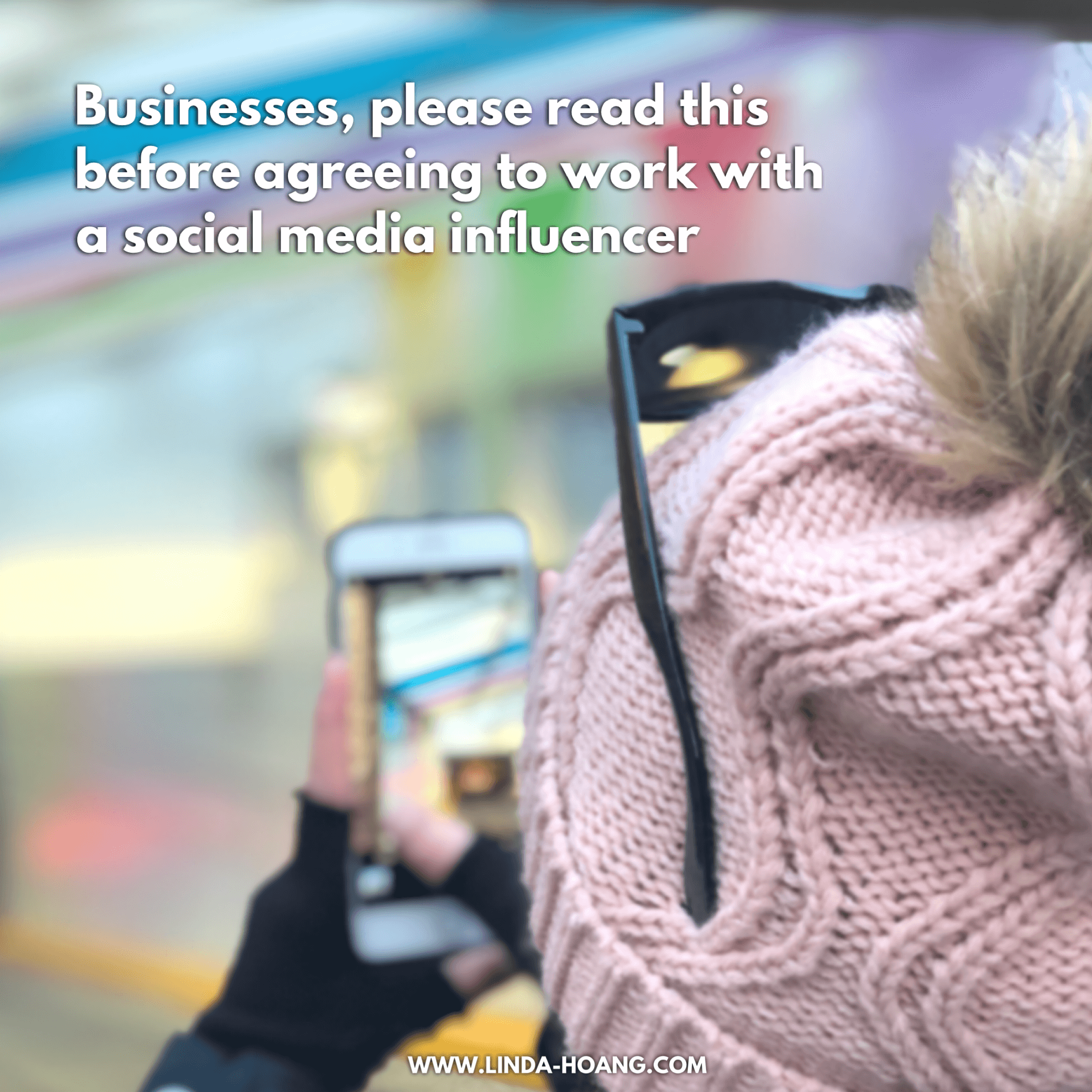Welcome to my TED Talk!
(lol, just kidding. But this is a topic I’m passionate about it and this is a bit of a read so do settle in!)
Too often today, people are starting up Instagram accounts, throwing “DM for collaborations” in their bio, and sending messages to businesses asking for free stuff in exchange for social media posts promoting the business.
And too often today, businesses are agreeing to this type of influencer partnership without putting much thought or research into the decision.
The topic of social media influencers—and increasingly finding and educating on the distinction between legitimate influencers and ones who just want free stuff but aren’t actually providing value to your business—is especially meaningful for me as I often work with companies as an influencer but also work with influencers on behalf of companies as a social media specialist. Both “hats” have become work I do professionally. So when I see partnerships roll out a certain way, it hurts me from both that influencer and that business perspective.
There are a lot of things I could say about influencer marketing and lots of things I have said about it—at conferences, in one-on-one or group training sessions, in conversations on and offline, lots of things I want to say directly to influencers or people trying to become influencers, but the focus of this post is aimed at educating business owners on how they should approach messages they might receive from influencers wanting to partner up.
I want to be clear. In no way am I knocking the value of influencer marketing. I’ve seen its value firsthand and honestly from an influencer perspective, I love working with companies to develop content for their brands.
Many people scoff at the idea of influencers, and even describing yourself as an influencer often comes with some cringes—mostly because there are a lot of “influencers” out there making a really bad name for themselves and for the industry as a whole.
There are aspects to the topic of working with influencers today that is troubling me to a point where I don’t think advising on the topic should be kept to industry conferences or training sessions with businesses, it should really just be out there for anyone (hopefully influencers and businesses alike) to read, better understand and hopefully take into consideration when or if they decide to try influencer marketing.
I think businesses, where it makes sense for their business goals, after they’ve done research, understand what they want out of the partnership and are confident about the influencer they’re going to work with, should absolutely consider engaging in influencer partnerships as one way to market their business. It can be extremely valuable.
92% of consumers trust recommendations from other people online—even strangers—over branded content from a company. Influencer marketing is expected to become a $5-$10 billion industry in the next five years and 94% of marketers who are already using this type of marketing say it is effective. When done right, influencer marketing can get businesses 11x higher return on investment than traditional marketing tactics.
So yeah, influencers are a thing.
But unfortunately not all influencers are legitimate or professional. Some are, and some aren’t. Some of them mean well, and some of them don’t. And most businesses just don’t know how they should be working with an influencer.
“What I do when an influencer messages me asking if I want to work with them?” is actually a question that comes up all the time when I’m talking about influencer marketing with businesses.
Many just don’t know any better. Many don’t understand what influencer marketing is or what influencer partnerships look like. And there isn’t really clearly defined resources around how businesses should or shouldn’t interact with influencers.
There’s also little regulation around influencers themselves—what makes someone influential online? How should an influencer approach businesses? How should they disclose the partnership? Should they? (hint: yes, please be transparent). There’s some guidelines now around how influencers should disclose their working relationships with businesses, but as literally anyone can just suddenly become an influencer, there’s no assurances they even know or care about disclosure rules. Plus, it’s the Internet and social media, and things change rapidly.
Businesses may see social media posts from users promoting another company, maybe a competitor, and they want that too. So when an influencer reaches out promising just that—promotion of your business to their X number of followers in exchange for some (often free) service from you—businesses get excited and agree. Even if the partnership may yield their business nothing truly valuable in the end. (Or they may not know what to measure as a successful partnership. That’s a different blog post).
I’ve been extremely fortunate to work with a wide range of businesses as an influencer, and I hope (and at least, based on repeat work, positive feedback and relationships built with businesses) that I’ve done good work providing social media and content services in a professional way. I hope to continue to do so.
As I mentioned, there are many legitimate social media influencers who are credible, authentic, and working with businesses in a fully professional manner. But then there are a ton of “influencers” who aren’t.
Businesses need to scrutinize “influencer” requests and influencers themselves far more than they’re currently doing. This scrutiny will make everyone better. It will make the industry better.
Before you, as a business owner, decide if you should work with an influencer, ask them some specific questions.

Feel free to share my blog post to business owners you know!
If an influencer is at a stage where they’re proactively reaching out to businesses to request a free meal, a free stay, a free trip, or any kind of free or compensated partnership, you as a business owner have every right to ask them for proof points to ensure the partnership will be professional and valuable for you.
If someone is pitching themselves to you, if they’re offering a few Instagram stories or maybe a post, maybe a tweet, whatever social media content in exchange for a complimentary experience, if they’re telling you their social media posts can help raise awareness of your business, maybe get more people through the door, then they are no longer just using Instagram for personal reasons, it is no longer just a fun hobby for them. They are now entering into the marketing and advertising industry and your interaction with them should be treated as a working relationship that includes the professional and ethical expectations you would apply to hiring a social media specialist, a marketer, a media buyer, a public relations strategist or any other role where people and companies are offering this communications and marketing service professionally.
If being treated as a professional offering marketing and advertising services to your business sounds pretty intense for the influencer, if information you request before you decide to work with them is not something the influencer is interested or even able to provide you, or if the influencer responds with something like “whoa, chill that’s too much I was just asking if you wanted some free social media posts,” (or maybe they won’t reply to your questions at all), then that influencer shouldn’t be trying to sell these kinds of services and you shouldn’t be working with them.
Asking just a few questions before you agree to work with an influencer can help you determine legitimate influencers from illegitimate ones pretty quickly. Here are 4 questions I’d recommend you ask:
1. Can I see a breakdown of your audience insights? What is your audience demographic? Can you let me know what your typical post engagement is? Can I see screenshots of your analytics?
Please don’t just be impressed with the size of an influencer’s followers. There’s a whole other blog post just waiting to be shared (well, actually there’s a ton out there already) around how accounts can and are buying fake followers, inflating their numbers to look impressive on a surface level. Dig deeper.
But beyond the flashy numbers, determine if their audience is your audience. If their followers are primarily out of the city or even country you’re operating in, is reaching them valuable to you? If their audience is primarily 18-24 year-olds and your business target audience is 35+ (for example), is reaching a younger demographic in your best interest?
The screenshot question is an important one because guess what—people lie. They can and they do.
If you have no relationship with the influencer, if their tone, their language, their “pitch” feels a little off, ask them for screenshots to indicate their analytics. Legitimate influencers should not hesitate to disclose their engagement (things like likes, comments, impressions/views, reach)/audience demographics and other social performance, especially as social performance is literally one way you’ll be measuring whether the influencer’s post(s) are helping you achieve your business objectives.
Note: I’m not suggesting the higher the numbers the better the influencer either. If an influencer has a smaller audience but high engagement, tapping into that can be really valuable for your business too. There’s different ways to measure influencer return on investment, and there’s a lot for business owners to learn about understanding analytics, and which measures are important—but that’s also another blog post.
2. Can you show me links to a few examples of partnerships you’ve done? Can you show me links to some of your posts in general that might be relevant for my business? Can I talk to someone you’ve worked with before?
If the influencer is pitching themselves to you, then they’re pitching themselves to other businesses too. If they haven’t already included it in their message to you, ask to see what other influencer partnerships they’ve done. Ask for links. Then gauge them.
How is the tone of their post caption? How is the quality of their photo or video? What do the comments look like? Is there even a link? Do they post something during the period they’re talking to the business but then delete the post(s) after the fact? (Some influencers do this).
You could take it one-step further (again, treating this like a professional working relationship) and ask for references. Can they provide you with contact information of other business owners they’ve worked with who can vouch for the work and character of the influencer?
What about non-partner posts? What do they post just because they like or are passionate about the topic? Are all of their posts sponsored?
A notion I used to love a lot about the idea of influencers is how an individual sharing content they are passionate about online, can authentically build their own captive audience and eventually result in opportunities to do and share more of this topic they love and are posting about already. That’s so cool. But it needs to start with the person being passionate about X, so they post about X, and opportunities arise from that passion. It should never start with a person wanting to get free stuff so they’re going to post about X.
Is the influencer who is messaging you still sharing their own content? Does the influencer even share content relevant to your business? Or are they straight up just an account that started because they wanted to get free stuff?
3. Can you tell me exactly what you will offer me?
Influencers who work with big companies are signing contracts and agreeing on pretty specific deliverables. This is all being captured in writing. Companies paying influencers for work are guaranteeing certain content in exchange for some form of compensation. There’s no reason you shouldn’t be getting these deliverables in writing either, even if it’s an Instagram Direct Message exchange or just through email, and even if you’re not paying but you’re still providing some kind of complimentary service.
Before you agree to provide an influencer anything, make sure you have in writing what they’ll do for you and in exchange for what.
Is it a few social media posts? What posts? Do you get an Instagram post that’s more permanent? Or a few Instagram Stories? A blog? In what time frame will the influencer produce these posts? Can you be clear about what happens if the influencer doesn’t have a good experience with your product or service? Do they agree to not post anything at all? Do you take a risk, knowing surely your product or service will deliver a positive experience?
Make expectations from both sides very clear and have the agreement in writing.
4. Can you give me some time to think about it?
Something I love hearing from business owners who reach out to me for influencer work is that they’ve been following me for awhile, and they love what I do, what I post, my personality, and they think working together would be a great fit for both parties. They know this because they’ve spent time following me, looking at the kind of posts I share, how I write, my tone, my voice, my photos, and getting a better understanding of who I am. That ‘fit’ is so important. You want to be selective about who you work and align with as a business, and influencers should feel the same about the business they agree to partner with too.
Too often, businesses will work with influencers without really understanding this—who the influencer is, what they post, how they talk and interact with their community. So take some time to learn just that. Different users have different voices online. They have different topics they post about. They have different approaches to how they post. Some may make more sense for your business than others.
If an influencer reaches out and you don’t already follow them, you don’t already see them posting within your community or your industry, you don’t know them—then ask for some time. Don’t agree right away. Start following them. Read their posts. Watch their stories. Figure out if this is the kind of person you want aligning with your business. Don’t agree to their pitch right away if you don’t feel fully comfortable and understand who this person is. Take the time to do the research.
—
I’ll wrap this up by saying, reading this post might make it seem like the process to determine whether you should work with an influencer is a pretty intensive one. That’s because it should be.
By scrutinizing just a bit more than maybe you were planning to, or ever thought to, you can ensure you get what you need out of the partnership. That both sides do. That’s how you start weeding out legitimate influencers from the “influencers” people are rolling their eyes at. That’s also how the industry can start regulating itself, and how influencers who are just sending out requests for free stuff with no proof points or professionalism can start to be better and do better. The whole industry can become better.
Especially if you have no relationship with this influencer, you need to scrutinize. You need to do your research.
And honestly sometimes, and especially if you’re working with an inexperienced influencer, even with the scrutiny they may go ahead and screw you over anyway. Maybe they’ll take the free stuff and won’t share a damn thing. Maybe they share and delete so the promotion is short-lived. Maybe they give your product or service a terrible review. That’s always a risk. But you can try to avoid these risks by asking the questions I’ve suggested above, gauging responses, doing research and knowing best you can, the kind of person the influencer is before you agree to anything.
To be clear and for full disclosure: Although most influencer work I do is a result of the business reaching out to me, I have certainly reached out to businesses pitching myself as an influencer as well. That’s not wrong to do, and certainly it’s a real, income-earning profession today, with lots of really awesome content creators sharing great stories, photos, videos and more with the businesses they partner with. But please if you’re going to do it, do it right. Treat it as real work. Be professional. Be ethical. For my own pitches I often reverse engineer the questions I’ve listed in this blog, and try to answer these questions for businesses before they even ask me. That’s the difference, and that’s what I hope more influencers do if they’re getting into this realm. (I have a lot more I could say in terms of advice for the influencer versus the business, but this particular blog post is really for businesses).
To reiterate, if an influencer is reaching out to your business offering an exchange of services or payment for posts, this partnership should be treated like any professional, working relationship. You as a business owner have every right to scrutinize, to ask for more information, to better understand who it is you’re agreeing to work with and how working with them will actually benefit you. It should be clear what both sides are getting from the exchange.
When both sides treat influencer requests as a professional business exchange, the influencer marketing industry will be better.
Thanks for reading my post on this topic that I’m clearly pretty passionate about!
I think it will be the start of a series on a few different influencer blog topics.




2 Comments
Holyshit this is awesome. Most of the people that throw around the term “influencer” are the worst ones to avoid.
or I guess best ones to avoid. English is hard.